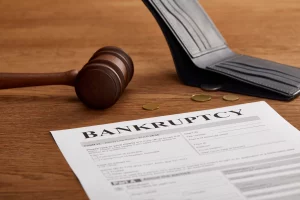Bankruptcy Exemption Attorney in Denver, Colorado
The new bankruptcy law is strict on people’s finances, but you can still protect some of your assets. When filing for bankruptcy, the law allows individuals to protect some of their assets. In Colorado, the law allows a person to protect exempt property.
Under Colorado state law, each person can protect a set amount of property and money. The amount is dependent on the person’s income and assets. To protect a particular asset, it must be listed on the bankruptcy form. You can get help from a bankruptcy attorney in Denver to protect some or all of your assets and get a fresh start.
Why do I need a bankruptcy exemption attorney in Denver?

If you have financial troubles and are not sure where to go or what to do, you may find yourself confused and discouraged. It is stressful to take on big problems with no help, but there is a lot you can do when you educate yourself. An experienced attorney can help you understand the law and manage your financial uncertainty.
A good bankruptcy exemption attorney can help you make informed decisions about what you need to do to get through your situation. You can find an experienced Denver bankruptcy exemption attorney by reading reviews and making an appointment for a consultation. Or better yet, contact The Law Office of Clark Daniel Dray. Our bankruptcy exemption attorneys in Denver will provide the personalized service and attention to detail that you will need.
Understanding bankruptcy
Bankruptcy is a legal action that involves a person or business that is unable to repay its debts. The bankruptcy procedure begins with a petition filed by the debtor or, less frequently, by creditors. All of the debtor’s assets are measured and analyzed, and a portion of the debt may be repaid using the assets.
Bankruptcy provides an individual or organization with an opportunity to start over by erasing unpayable debts and allowing creditors to seek some form of repayment based on the individual’s or business’ liquidated assets.
Theoretically, the opportunity to file for bankruptcy promotes the economy as a whole by giving individuals and businesses a second chance to access credit and by providing creditors with a share of debt repayment. After the successful completion of bankruptcy proceedings, the debtor is discharged from the debt obligations incurred prior to filing.
In the United States, all bankruptcy matters are handled by federal courts. A bankruptcy judge makes all decisions in federal bankruptcy cases, including whether a debtor is eligible to file and whether their debts should be erased. A trustee, an officer designated by the United States Trustee Program of the Department of Justice to represent the debtor’s estate in the hearing, typically administers bankruptcy cases. Unless a creditor raises an objection in the case, there is typically very little direct contact between the debtor and the judge.
How to Take Advantage of Colorado’s Bankruptcy Exemptions?
In order to safeguard your assets, regardless of whether you intend to file for chapter 7 or chapter 13 bankruptcy, the Colorado Bankruptcy Court requires you to list and match your assets to the applicable exemption. This can be accomplished by filing bankruptcy schedules with the court. An experienced bankruptcy attorney can manage this for you and will know how to list your assets correctly so that they are protected.
Both chapter 7 and chapter 13 cases in Colorado allow for fairly large property exemptions.
The following are the most notable Colorado exclusions, while it is by no means a full list:
- A homestead exemption of around $60,000 is available. For the aged (60 years or older) or disabled, this amount rises to about $90,000.
- Around $5,000 exemption for motor vehicles. For the aged (60 years or older) or disabled, the amount climbs up to $10,000. (In leased automobiles, there is no equity.)
- Exemption for ERISA-qualified retirement accounts and IRAs worth more than $1 million.
- Exemption of about $20,000 for tools of the trade that are mostly used for employment.
- Around $2,000 jewelry exemption
- In personal injury cases, revenues due to pain and suffering are exempt 100 percent, whereas lost wages are only exempt roughly75 percent.
- Wage exemption of 75% (after statutory payroll deductions).
Except for the homestead exemption, which “runs with the land” and cannot be claimed by each spouse, these exemptions are doubled for married couples filing jointly.
When determining the property’s value, the initial purchase price is immaterial. What matters is the property’s worth on the day the bankruptcy is filed. Particularly susceptible to rapid depreciation are automobiles and household goods.
Valuing Your Assets for Tax Exemption
Asset valuation rules can be complicated. The value of your assets, for example, can be determined in a variety of ways, including a garage or fast sale, an auction, or replacement value.
There are other criteria involved in a proper assessment, in addition to your assets being assessed in various ways. In some cases, deducting the cost of selling the asset from the value is appropriate.
If the Bankruptcy Trustee were to sell an asset you held and transfer the proceeds to creditors, for example, the Trustee might need to employ an auctioneer. The auctioneer could cost as much as 10% to 15% of the asset’s value. The assets may be reported in your bankruptcy minus the cost of sale in this situation.
A skilled Colorado bankruptcy attorney can save you thousands of dollars by properly matching your assets to exemptions and declaring their worth effectively. But what if you have valuables that can’t be safeguarded?
Unprotected Assets
Assets that are not legally protected can be managed in a variety of ways. For instance, if you wish to maintain an unprotected asset, your bankruptcy attorney can negotiate a deal with the Trustee in exchange for keeping the item.
Alternatively, your attorney may suggest a different type of bankruptcy, such as Chapter 13 bankruptcy, which may permit you to retain the asset. Different types of bankruptcy have distinct regulations regarding the retention of assets.
Contact us at our Colorado office now!
If you are in a financially difficult situation, we are here to help you. At The Law Office of Clark Daniel Dray, our main focus is guiding debtors through their insolvency proceedings. Our job is to advise those in debt regarding their legal rights and the advantages of filing for bankruptcy. We work hard to have a positive outcome for your bankruptcy case, which is why we handle each of our clients on a case-by-case basis.
Talk to our bankruptcy law firm in Colorado and get legal advice from a seasoned local attorney. Contact our Denver bankruptcy attorneys at The Law Office of Clark Daniel Dray. Let’s work on your list of bankruptcy exemptions today!


